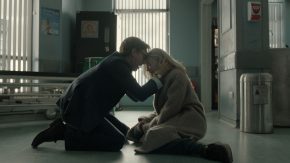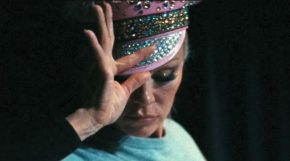Emerald Fennell’s “Saltburn” is primarily a story of obsession, desire but also machinates with a dose of twisted humor, all set in the British upper class system – and a castle of over 60 bedrooms.
The film sets off with a stylish and captivating start, drawing viewers in with its rich (whoa) atmosphere and intriguing characters. Fennell pays homage to classic novels – from Daphne du Maurier stories to the „Magnificent Ambersons”. However, as the plot progresses, the movie seems to lose ground and momentum, relying too heavily on its initial strengths and failing to deliver a truly satisfying, self-made chapters and ending. What a shame!
“Saltburn” has an intriguing opening sequence, where our protagonist Oliver (Barry Keoghan) reflects on his relationship with Felix (Jacob Elordi). The classical concerto background music creates a dramatic atmosphere, and the mash-up part overflows with stylish creativity. The cinematography and colors are striking, but at times become distracting, such as Barry’s many reflections in his dormitory’s window and the candlelit table. Less is sometimes more.
The movie’s atmosphere is captivating, with a strong aesthetic that is reminiscent of classic romantic French and British paintings (The scene where Felix and Oliver try to throw the brick in the river stands out, that texture is just wow!). Throughout the film, we follow the working class, traumatized (…) Oliver, a scholarship student, navigating the world of Oxford’s highest circles of posh and the complexities of relationships. Oliver quickly after arriving at Oxford becomes „friends” with Felix, who introduces him to his eccentric family, including his shallow narcissistic mother, played by Rosamund Pike, in a comedic and multi-dimensional performance.

Source: Medium
As the story heads into the deep end, Oliver’s transformation is abrupt (no spoilers!), as he suddenly becomes manipulative and rotten. His favorite game is blackmailing characters through sexual exploits, which after a while grows repetitive and does not add much depth to the story itself. (The bathtub scene is great though.) Despite the film’s strong start, it becomes evident that the script loses ground, falling back on cliches and predictable plot points familiar to those who suffered through all the 500 Shades of the „50 Shades of Grey” movies.
Despite its many strengths, “Saltburn” falls really short in the closing chapters. It seems like the filmmaker-writer runs out of classic pieces to draw upon. Fennell struggles to create a cohesive and satisfying conclusion without the support of external reference points.
Despite its flaws, “Saltburn” remains an enjoyable film with impressive cinematography, a „rock and roll concert” level vibe of cool, playful soundtrack, gothic elements, and strong performances from its cast – Keoghan yet again proves to be one of the most talented actors of his generation.
Especially in its first half, “Saltburn” seems to be the provocative, pop-sour-sugar-candy, colorful movie that „Barbie” aspired to but failed to be. Fennel has an intriguing concept and a fun approach to storytelling, but maybe has not found her distinctive voice yet as a filmmaker. Anyways, for fans of gothic and literary-inspired films, it is definitely worth the shoot. Get ready for a costume drama with no classic costumes (and sometimes no clothes either).
While the film falters in its final act(s), it remains an engaging and visually stunning experience. With its dark humor and literary allusions, “Saltburn” is a film you will not likely forget. Much like Felix’s introduction to Saltburn: “Red staircase, broken piano, (points to a corner) accidentally fingered my cousin here, and this is the blue room because it’s fucking blue”.
Saltburn is now available on Amazon Prime.
~ by Dora Endre ~



























Comments
1 Responses to ““Saltburn”: Oliver Twist and the Slutty Fairies”
Wow, this sounds like a beautifully crafted film that merges obsession, desire, and twisted humor all within the confines of the British upper-class system. I especially appreciate Fennell’s nod to classic novels and her artistic use of color and cinematography. However, it’s a shame that the movie loses momentum as it progresses, relying too heavily on its initial strengths. Despite this, the film seems to have a strong start, with intriguing characters and a captivating atmosphere. I’m definitely intrigued by the transformation of Oliver and the eccentricities of his newfound social circle. It’s unfortunate that the ending falls short, but overall it seems like an enjoyable watch filled with strong performances and impressive visuals. Thank you for the insightful review!